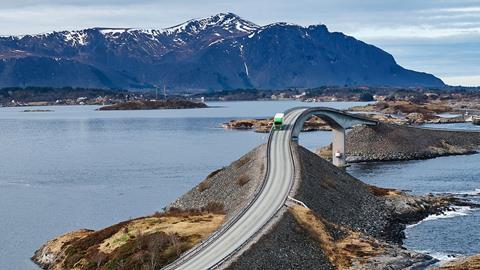Scania is celebrating strong financial results in 2024 which saw it achieve record sales and earnings, with vehicle deliveries exceeding 100,000.
The manufacturer attributed its performance in 2024 to stable production rates and its order book returning to “more normal” levels.
Scania Group net sales grew by 6% to SEK 216.1bn (£16.5bn), adjusted operating income reached SEK 30.4bn (£2.32bn) and Scania’s adjusted operating margin was 14.1%, the company revealed.
Deliveries increased by 6% to 102,069 vehicles during the year, of which zero emission vehicles (ZEV) amounted to 266 units.
Revenue from the service business increased by 3% while order intake decreased by 4% to 81,012 vehicles.
In a summary of the fourth quarter of 2024 Scania Group revealed that net sales decreased by 4% to SEK 57.4bn (£4.39bn), while deliveries decreased by 3% to 28,014 vehicles, of which ZEV amounted to 77 units..
Adjusted operating income reached SEK 7.7bn (£0.59bn) and adjusted operating margin was 13.3% in the quarter.
However revenue from the service business increased by 3% and order intake increased by 10% to 24,599 vehicles
The manufacturer said that, despite a “more cautious” truck market in Europe, due to high inflation, Scania had boosted its European market share grew by over 2%, to 17.8%.
In Latin America, Scania’s market share increased to 17.3% and demand remained strong, especially in Brazil.
Scania added that its global production system with hubs in Europe and Latin America “effectively balances” regional market fluctuations.
Scania said scaling up battery-electric truck production has been “complex”, impacting the company’s decarbonisation efforts. It added that with demand for its premium battery-electric trucks rising rapidly, the company is expanding its supplier network to enhance resilience and accelerate deliveries.
The manufacturer added that in 2024, it made “significant advances” towards a sustainable transport system through infrastructure investments, innovative solutions, and strategic partnerships.
The company said it had also made strong progress in decarbonisation, cutting operational emissions by 47% through green electricity, decarbonised logistics, and lower energy use, putting the company on track to surpass its 2025 goal of a 50% reduction in Scope 1 and 2 emissions.
For Scope 3 emissions—those from vehicles in use—Scania has achieved a 12% reduction.
However, despite the significant improvement from last year, it remains short of its 2025 target.
The company said it is intensifying efforts in driver coaching, renewable fuels, and vehicle optimisation, to narrow the gap to a 20% reduction.
Looking ahead, Scania has also set new 2032 targets across all scopes, aiming for a 50% emissions reduction in its operations and a 45% cut from vehicles in use, compared to 2022 levels.
Scania chief executive Christian Levin, said: “I am very proud of the Scania colleagues. Despite many challenges, we delivered an outstanding operational and financial performance.”
He added: “Scania’s commitment to decarbonising our business in line with science stands firm. Setting new targets is a proof point of our high and industry-leading ambitions.”






















